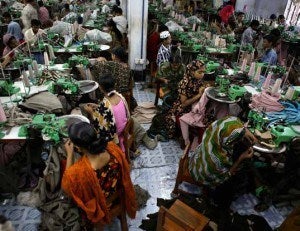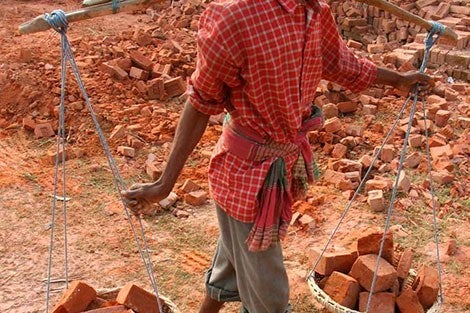[ Spring 2013 ]
The medieval system of bonded labor traps millions of workers worldwide for life.
In a thatched hut in Bihar, India, amid agricultural fields and brick kilns where his children and grandchildren toiled away, an elderly man with shaking hands prepared tea. The “frayed skin scarcely covered the crumbling bones beneath,” later wrote his guest, Siddharth Kara, who recently became a fellow at the François-Xavier Bagnoud (FXB) Center for Health and Human Rights. The man’s name is Ajay, and he is a modern-day slave. He has spent more than five decades, his entire adult life, in so-called bonded labor, forced to work to pay off debts to a local landowner.
The original loan, incurred when Ajay was 17 years old, totaled 800 rupees—about $18—to pay for his marriage. After decades of work, he still had not paid off the debt, which eventually consumed him and his family. When his wife became chronically ill, Ajay was too poor to afford medicine, and his wife died. Ajay suffers even more because he knows his two sons and grandchildren will inherit his financial obligation. “No one in this country cares about people like us,” he told Kara. “We live and die, and no one but ourselves knows we have drawn breath.”
Frozen fish to fine marble
The story of Ajay, and hundreds more in similar situations, is recounted in Kara’s new book, Bonded Labor: Tackling the System of Slavery in South Asia. The deeply researched exposé examines this cruel system of exploitation, sometimes called debt bondage. Kara, who is also a fellow at the Carr Center for Human Rights Policy at the Harvard Kennedy School, estimates that there are 18 to 20.5 million bonded laborers in the world, more than 84 percent of whom reside in just four nations: Bangladesh, Nepal, Pakistan, and most of all, India, Kara’s native country.
Selection of commodities produced by bonded laborers
|
Although the practice of debt bondage largely takes place in South Asia, the products of this institutionalized system of exploitation are consumed worldwide in everyday life. Kara found that bonded labor is used in a vast range of commodities and consumer goods, including frozen fish, tea, coffee, rice, wheat, diamonds, sporting goods, apparel, and marble. Nearly three-quarters of the frozen shrimp exported from Bangladesh, for example, is produced by bonded labor or child labor.
Stemming from a medieval system of labor, debt bondage is today an integral part of globalization, as transnational companies scour the world for cheaper labor and higher profits. As Kara writes, “[T]he persistence of bonded labor in South Asia is driven by the ability to generate substantial profits at almost no real risk, through the exploitation of an immense underclass of systemically impoverished and vulnerable people.”
Treated like “dirt and chattel”
Though a 1976 law banned the practice of bonded labor, it has gone largely unenforced. In a later Indian Supreme Court decision upholding the law, Chief Justice P. N. Bhagwati decried the hypocrisy of a society that “treats large masses of people belonging to the lower rungs of the social ladder or economically impoverished segments of society as dirt and chattel.” According to FXB Director Jennifer Leaning, the problem “is cyclical, it’s chronic and it’s deeply entrenched in the economic system of the state. It is fundamentally a problem of corruption and poor regulation.”

Kara’s unusual method of investigation, euphemistically known in academia as “active research,” is highly immersive. He spends countless hours with his subjects and their families, getting to know them and sharing in their work and lives. He makes it a practice to engage for up to a day in the grueling tasks he is writing about, so that he knows the experience firsthand. He has plowed fields, broken stones, tended a kiln, harvested shrimp, planted rice paddies, hand-rolled cigarettes, polished gems, and woven carpets.
“Simple scientific research is not adequate for this kind of project—it’s an intensive human engagement, trying to appreciate the predicaments of another human’s existence,” Kara says. “I wanted to make sure that I knew what their lives were like.” Forging a personal connection with his subjects is integral to telling their stories of hardship, he adds. “When anybody shares an intense pain, there’s a bond of trust.” A more traditional research approach—using a questionnaire, for example—can’t capture the real-life complexities.
“Is this how I want to spend my time on the planet?”

Although Kara had witnessed forced labor as a child in India, he didn’t fully understand the issue until he was an undergraduate at Duke University, in the early 1990s. Volunteering at a Bosnian refugee camp, he heard disturbing stories about sex trafficking and rape camps, where Serbs reportedly systematically raped Bosnian women. Continuing his studies back in the U.S., he never forgot the experience.
In 2000, after several years as an investment banker, Kara asked himself, “Is this how I want to spend my time on the planet?” Contemplating his next move, he recalled his college experience in Bosnia and started to look into the issue of sex trafficking. Surprised to find a dearth of research on the problem, he decided to do the research himself. In the beginning, “I was just some investment banker who hopped on a plane,” he says. But after nine years, that work became his first book, Sex Trafficking: Inside the Business of Modern Slavery (published in January 2009), which received Yale University’s Frederick Douglass Book Prize in 2010. His new book fills out what he learned with a wider-ranging look at human servitude.
How can consumers stop bonded labor?
|
Kara says his work would not have been possible under traditional academic constraints. “You would probably never get institutional review board approval for a lot of the research I did, especially for Sex Trafficking. It’s too risky in most cases.” When encountering horrific situations where someone was being abused, for example, Kara resisted the reflex to rescue them. To do so could cause more harm than good, he explains, because the victims or their families could face violent retribution. Instead, he alerted trustworthy local NGOs or law enforcement officials, who could take effective action. Kara also protected the anonymity of his subjects by using pseudonyms and withholding identifying details.
These days, Kara sees his role as multifaceted: academic researcher, policy adviser and human rights activist, yet not fully any one of these. His investigations, which have taken him to 31 countries across six continents since 2000, have been almost totally self-funded, using his banking earnings and funds from further finance advisory assignments.
“A common and pervasive assault”

For many, the system of bonded labor unfolds in a hellish perpetuity, passed on generation to generation. A man named Gaurav, toiling at a brick kiln, recounts to Kara how he inherited his debt from his father. “No matter how hard I work, I am always in debt. I have taken so many loans through the years … I take loans for food and water and cooking oil.” Finally, he tried to escape with his family, but was captured by the landowner’s men, who electrocuted him and then sold off his daughter to a trafficker. “I never saw my daughter again,” Gaurav tells Kara.
Young children are frequent victims of this exploitative system. Pratima was 14 when her parents sent her to work for a wealthy family in Kolkata (Calcutta). In exchange, they were given an advance of 3,000 rupees, or about $67. For three years, Pratima dusted, cleaned, washed, and cooked, without a day off, with only a mat to sleep on and leftovers for her meals, while being shouted at and demeaned by her employers. All the time, she was supposedly working off the advance that had been given to her family, but Pratima never saw a penny. While Pratima was never physically abused, other girls Kara encountered were not so lucky, regularly suffering rapes and beatings at the hands of their employers.
Jennifer Leaning explains that human trafficking and debt bondage are classic public health issues, because they are “a common and pervasive assault on the life chances of children and adolescents.” Kara’s work, she says, is in keeping with the evolving mission of public health over the last 50 years, from a narrow focus on disease to a broader range of issues that includes psychological well-being and interventions that bolster an individual’s ability to live life to a full capacity.
Stopping servitude
Kara envisions both demand-side and supply-side solutions to the complex problem of bonded labor. On the demand side, Kara argues for several legal reforms, including laws in every country in South Asia that mandate a national minimum wage of at least $5 per eight-hour day for unskilled labor and higher for more skilled positions, and stricter laws so that commercial employers can be held liable if local subcontractors violate humane labor practices, as well as greater economic penalties for the offense of bonded labor. He would create rapid-response teams to identify and rehabilitate bonded laborers. Kara has also called for land reform: “Landlessness is a key driver of vulnerability to debt bondage,” he writes in his book, “and fear of eviction for landless tenants ensnares countless millions in years of slavelike exploitation.”
Destroying the forced labor systemSiddharth Kara has developed policy recommendations by diagramming supply chains and delving into the motivations of the people and companies that exploit forced labor. Among his proposals:
|
Among his proposals on the supply side: a comprehensive program that reduces extreme poverty, expands access to formal credit markets to the poor, improves infrastructure, and opens new markets to laborers. Kara also calls for national awareness campaigns for the general public, as well as educational programs for law enforcement, judicial and government officials focused on promoting the equality of minority castes and ethnicities across South Asia and on raising awareness of bonded and child labor.
“I hope that the analysis in this book, the voices of the bonded laborers that I share and the elevated awareness in media, policy and government circles will lead to more resources, more research and more efforts to tackle this issue,” he says. Kara’s book on debt bondage is the second in a planned series of three or four that will focus on forced labor. His next volume will cover such issues as organ trafficking and labor trafficking.
As Kara sees it, the biggest factor keeping people in bondage is lack of economic alternatives. “The duress is the force of grinding destitution. It is a colossal failure of society, of civilization, that millions of people have to face that devil’s bargain every day: Either I die or I accept servitude,” he says. “It is exceedingly painful to encounter hundreds of cases of extreme human barbarism and exploitation—particularly when you come from a world where people have so much. It is hard to comprehend that we all live on the same planet.”
Sam Loewenberg is a Boston-based journalist specializing in global health.
Download a PDF of Globalization’s permanent underclass here
